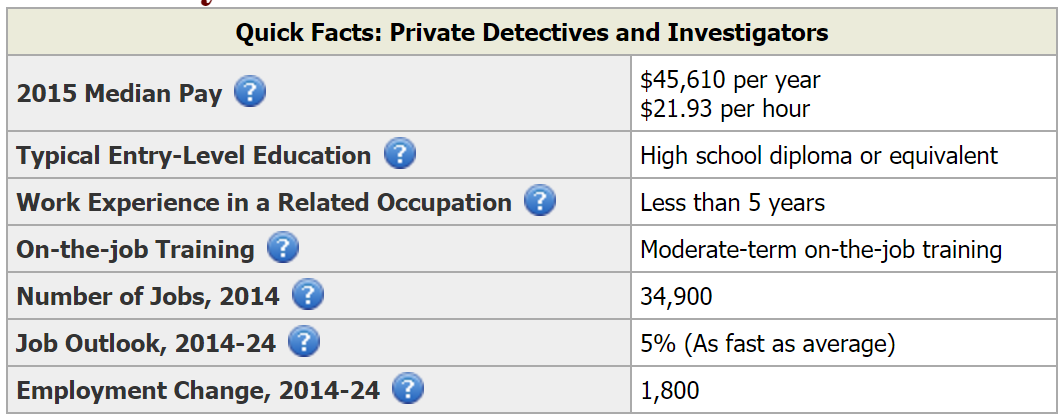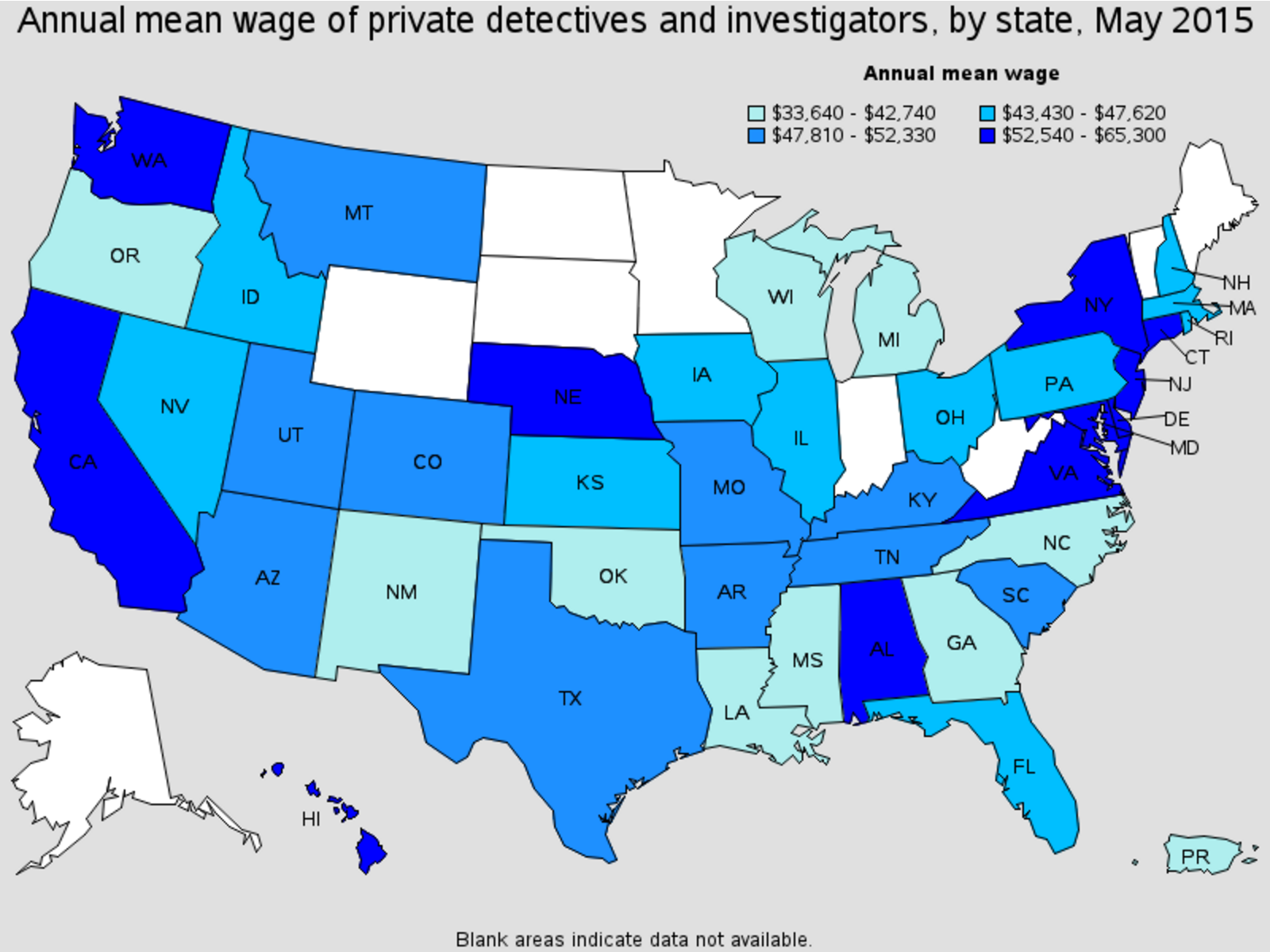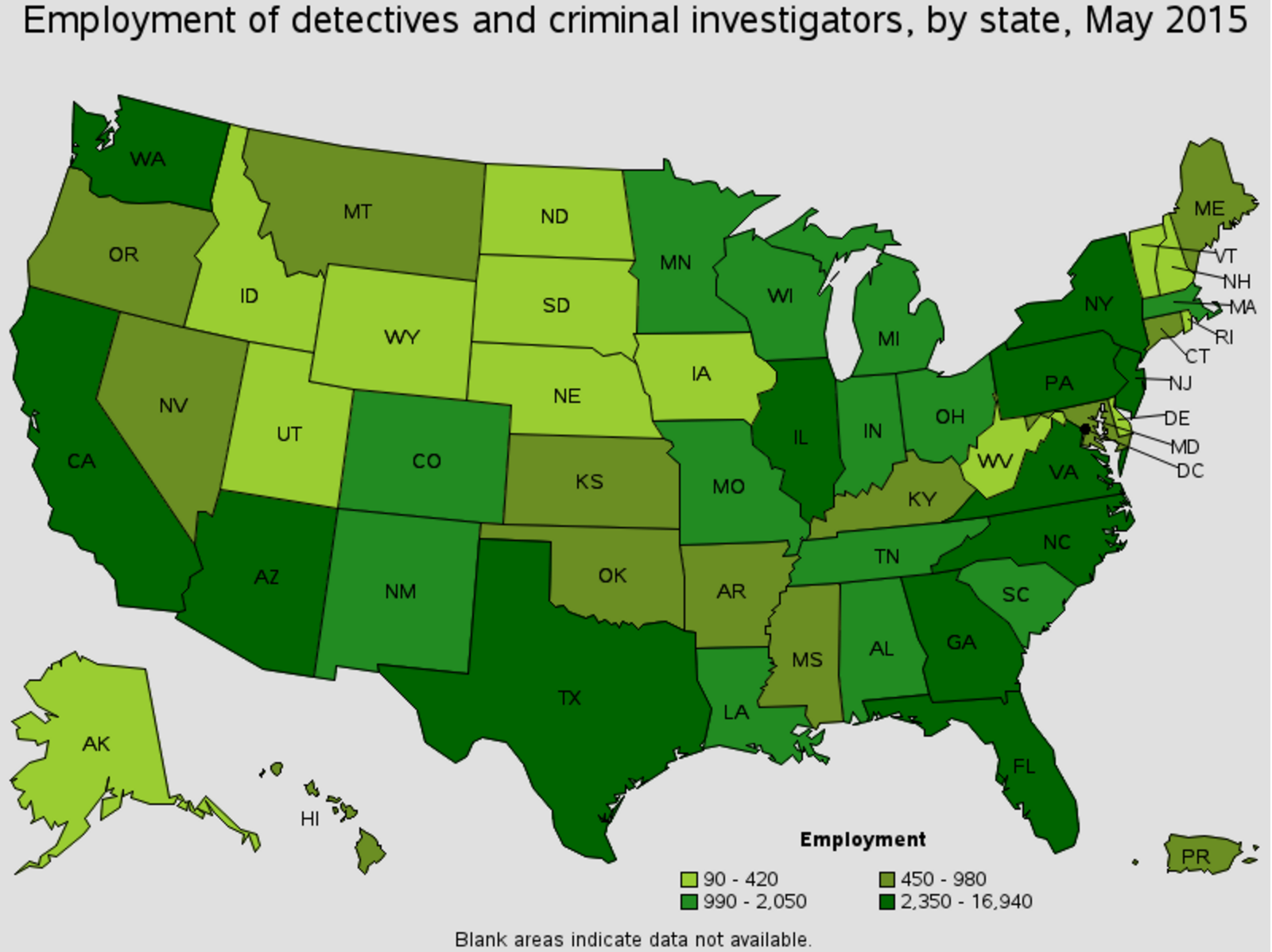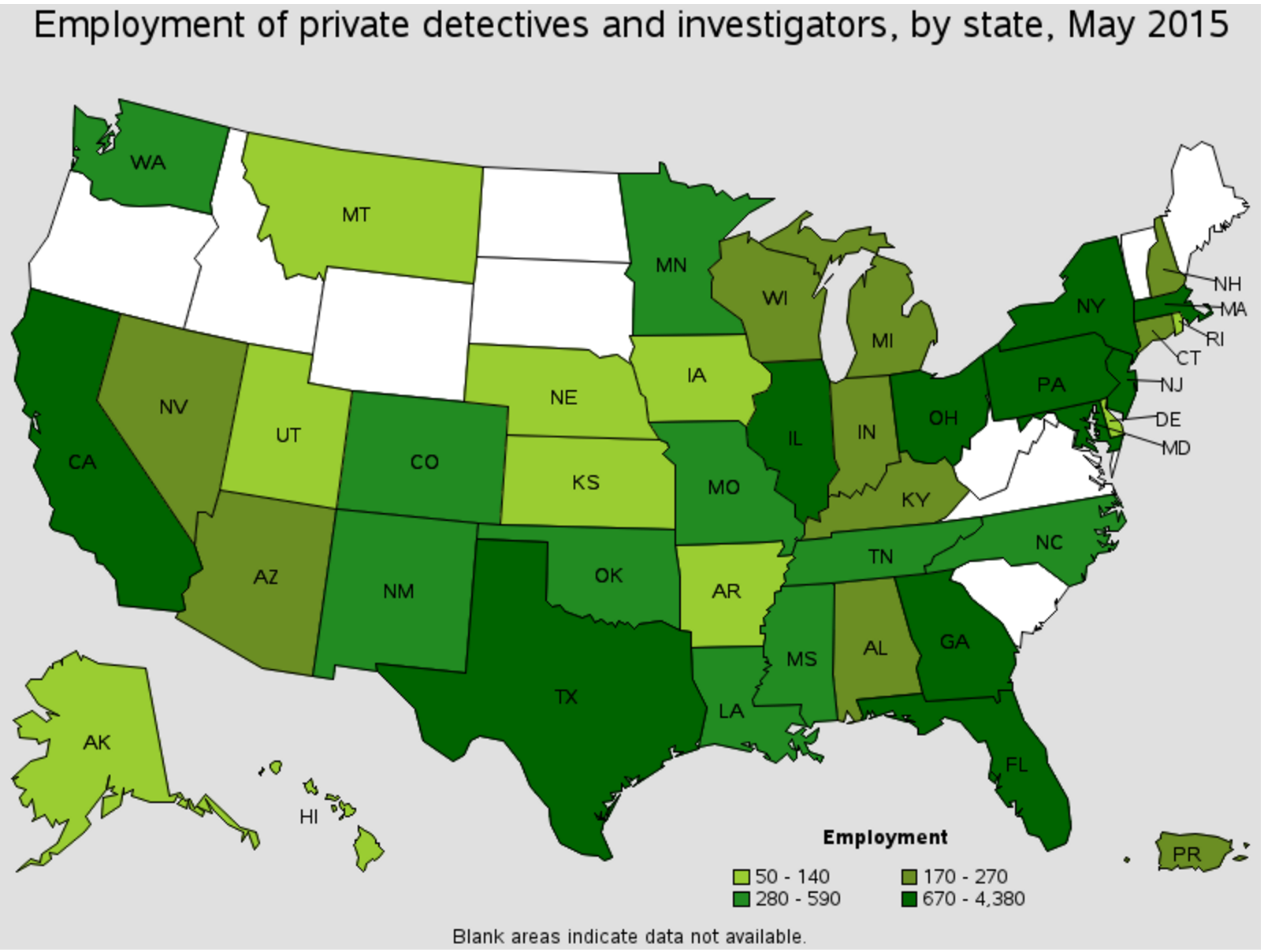Becoming a detective is a dream for those who grow up watching detective and serial movies. Assuming to be like Sherlock Holmes is normal for us after we have known his character. But this dream seems to be forgotten and we will work to more realistic goals. In recent years, due to the increased rate of crime, there is a greater need for detectives to solve them. This is the reason why some police officers are trying to be like Sherlock Holmes. For those of you who still haven’t given up on your detective dreams, here is some information on the exciting career of being a detective.


Table Of Contents
- Average Detective Salary
- Detective Career Outlook
- How To Become A Detective
- Detective Job Description
How Much a Detective Earns
The base salary of a detective first depends on his or her employer. An investigator who is employed by the state earns more than a private one in most cases. This is mostly due to steady work that they receive compared to the intermittent work of a private detective.The reason behind this is they always have work to do compared to a private detective. A state employed detective earns a national average of $76,000. For a private detective, he or she can earn about $45,000. The factors that affect a PI’s salary will be discussed later. Here are the factors that affect the salary of investigators that are state employed.
[asd_program_button /]Number of People
Just like police officers, the income of a detective is dependent on the city’s population. If the city is more populated, then the number of cases that need to be handled also rises. In this case, the salary will increase. The crime rate also affects the salary of an investigator. For example, the average salary for someone who is in the LA police department will range from $44,000 to $88,000. In contrast, for someone in Miami Police department, the average salary tends to be around $86,000 to $107,000.

Job location
The location is just the same us with the population of the place and rate of the crime. However, cost of living is another factor to consider. A detective will be paid higher if the cost of living in that certain location is higher. This is true with the case of private investigators as well. District of Columbia, Alaska, and New Jersey all pay 6-figure salaries with District of Columbia paying as much as $116,000.
Educational degree
For any police job (except at the federal level), a high school degree is sufficient. Though this rules sometimes varies with state, most states do not require higher education certificates. But, the importance of higher education is considered by some states and departments that is why a degree after high school is a factor that affects the salary of the officers and detectives. This may be an associate’s, bachelor’s or even a master’s degree. You will be paid more depending on your degree.
Experience
You will be paid as an investigator if you will be working in the field for a long period of time. For those who are working in the field for 20 years already even if they are not promoted will get up to $15,000 increase. But if you are promoted as a Police Chief, you will be paid about $180,000 per year.
Highlands Private Investigators
A private investigator’s salary depends on the number of cases he or she takes and solves. The location, amount of discretion needed, amount of danger involved, required extra equipment and other many things are the factors mentioned above that can affect the price. The investigator will quote the job price after the clients presented their problem.

A state-employed detective has a steady income that will increase by various means as described here. The salary of a private investigator cannot be determined and by being famous it can be increased. The path to choose will be determined based in the financial facts you have.
Career Outlook of a Highlands Detective
What we are going to talk about first is the growth in the fields. There were about 106,000 public detectives or criminal investigators on record in 2015. Meanwhile, private investigators who do the same job were only 30,000. Private detectives have grown for about 5% in the industry. This goes to show that by 2025, 1,500 new jobs will be opened. Such growth rate follows the 5% average growth rate in all other sectors. On the other hand, for public investigators, this figure is at 4%. This means there is going to be around 4,000 more jobs as a criminal investigator by 2025. This can be considered as an average rate of growth as well.
[asd_program_button /]The employment increases steadily because the population increases. As the population increases, more people need to be protected and more criminals need to be caught. However, with stricter laws and more advanced technology being use, the crime rate isn’t increasing that significantly. Thus, both the phenomena almost balance each other out leading to an average growth in both these careers.

In terms of location, Texas, California and New York have the highest number of Criminal/Law Enforcement Investigators. The employment in western states and Texas are higher that to that of the eastern parts. There are a lot of private detectives hired in California, Texas and Florida with the southern states compared in the northern part.
Let’s now find out where these two professionals are hired most by industires. As clear as day, The Local, State government and the Federal branch employ the most number of criminal investigators. Security Services, Consulting services are the ones who usually hire private detectives and the local government need them for consultation on a few cases.
Criminal investigators get higher payments than the private ones. The annual average salary of criminal investigators is $80,000 while Private investigators get $52,000. When combining the aspects of geography and finance, the District of Columbia, Alaska, and New Jersey is paying most the Public investigators. It is in Alabama, Nebraska, and New Jersey were private detectives are paid most.
Private industries that employ most do not pay the highest in comparison with the different industires. Private detectives are paid most in Electromedical, Navigational, Power generation, Metal Product forming and other such industries because of the most sensitive information that needs to be protected. For public investigators, they are paid most by federal agencies, postal services, and educational institutes.

How To Become A Highlands Detective
Detectives come in two kinds. Some of them are private investigators who can be hired by the general public to investigate on certain things. There are those who are government employees and after being promoted as a police officer gets the post. We will explore both avenues here.
[asd_program_button /]Be a High School Graduate
Due to excellent deduction skills, a deductive is able to take a leap from a police officer to a detective position. Thus, a general way in becoming a detective is to first complete high school and get into the police academy to become a police officer. Becoming a private investigator would mean getting a high school degree.
Earn a Bachelor’s degree
Usually, you don’t require a bachelor’s degree to get into the police academy. Although some officers would like to have other means of employment right after retirement. However, if you aspire to be a detective or land a job on federal level, you will need a bachelor’s degree.
Many institutions require applicants to have a bachelor’s degree in law, criminal justice or psychology to become a detective. Anyone with an associate’s degree is given training up to 5000 hours. However, the time required is reduced to 4000 hours if you have a bachelor’s degree.
Get the right amount of experience
To become a professional detective (not employed by the state), you need to have some professional experience as an investigator. Fortunately, you have several options available. Getting employed by the government is basically the most common method. You will be regarded as a person with experience if you worked as a criminal investigator or an arson investigator. Other than these, you can also choose to Public defender’s office investigator or a licensed repossessor.
Depending on the state you are applying in, the requirements of experience change. A state might require at least 3 years of experience, but in some it could be as long as 5 years.
Acquire a license for your guns
If an investigator doesn’t have a firearms permit, he won’t be allowed to carry his firearm. There are several firearms with strict requirements such as completing a full training course before the permits are issued. Therefore if you want to own a firearm while working as an investigator, completing the training course is necessary to get your own permit.
Complete a New Jersey licensure exam
Once you have fulfilled the requirements, you will need to take a state licensing examination. The test will include questions regarded state laws and have multiple choices to choose from. This examination is only for aspiring private detectives. After passing this test, you are officially a private investigator with a license.
Get New Jersey Insurance
Due to the dangerous nature of the work, you should make sure to get an insurance. Basically, this is a medical insurance worth $10,000. But since you’re carrying a gun with you for extra protection, and you will have to insure the gun as well, getting a higher amount will be an ideal choice.
By completing these steps, you’ll be good to go. You can finally fulfill your dream and become a detective! But be careful – as mentioned before, this can be a dangerous line of work. If you want to pursue your dreams, learn all about the requirements and complete them as soon as you can.
Responsibilities of Being a Detective in Highlands
Crime Scene Investigation
It will be a detective’s duty to carefully assess a crime scene and come up with the most sensible deduction. It will also include searching for clues and collecting evidences. Supposedly, they should collect anything that looks like an evidence which can be used in court hearings later. In some cases, detectives can receive aid from the forensic investigation department, hence allowing them to come up with more deductions regarding the crime. They are also supposed to go door to door and gather more evidence from eye witnesses or search for cameras wherever they might be installed.
[asd_program_button /]Criminal Research
Doing research regarding previous cases is regarded as an important aspect of a detective’s job. This is so that they can have an insight regarding criminal patterns and behaviors. Often, research into the past and previous case files give them an idea or a clue as to how the current culprit might be operating. In cases of serial killers or ‘copycats’, research helps a lot. This is also applicable when it comes to knowing what tactics a drug cartel is up to. Research also helps detectives make deductions more efficiently.
Narrowing down suspects
The whole objective of everything that a detective does is to serve justice to the person who has committed the crime. However, they will need to come up with a list of suspects first. In some cases, it could include over a hundred people, but there are also cases where there is none. They are able to come up with such list by piecing evidences, statements from eye witnesses, results from research, and a bit of forensics altogether. By means of getting statements from suspects, detectives are able to narrow down their list. With a narrowed down list, they will then have the suspects admit to their crimes.
Testifying In Court
As part of their final job, detectives will need to make sure justice is served. To help with the process, they are sometimes summoned to the court to testify against the suspect(s). In some cases, they will describe the evidence and how they are connected to the suspect, as well as narrating the possible crime scene. There are also cases where the one at fault will be escorted by the detective.
Highlands Private Detectives
Basically, the above mentioned roles are the responsibilities that detectives carry. The job description of a detective is a bit loose. Supposedly, detectives should meet their client’s needs regardless of how difficult it might seem, especially in terms of research. But there are limits which they shouldn’t go beyond when carrying out their duties. Private detectives are often hired for tasks such as gathering evidence from someone, monitoring certain individuals, or even tracking finances. They should never act in a way that they can be easily recognized as a detective in public. Moreover, arresting someone is out of their jurisdiction.
You see, the “Idiot Box However, the roles and responsibilities that detectives carry aren’t as easy as they seem. They are never displayed on portrayed on the media or anywhere else. Supposedly, they should carefully collect any clue and evidence since they carry such heavy responsibility on their shoulders. If the job still has you intrigued, then find out how long it takes to become a detective now!
